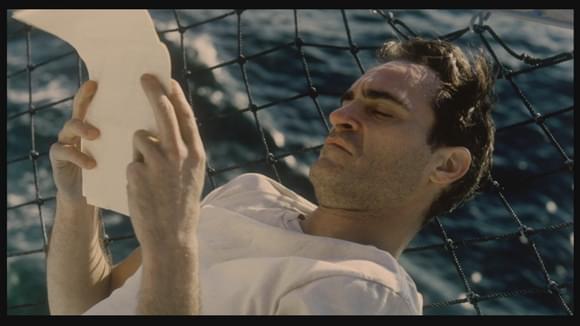The Master

Director(s): Paul Thomas Anderson
Writer(s): Paul Thomas Anderson
Cast: Joaquin Phoenix, Philip Seymour Hoffman, Amy Adams, Laura Dern, Ambyr Childers, Rami Malek, Jesse Plemons, Kevin J. O'Connor and Christopher Evans Welch
Reviewed by: Christine Lambert on
Release Date(s)
Sep 28, 2012 - WideUnless one has been to war, it is hard to imagine the horror and atrocities witnessed by soldiers. Though a soldier may be removed from the situation, the lingering memories and post traumatic stress disorder that many face will make their actions and decisions seem peculiar to those that do not have the first-hand knowledge of their experiences. Going back to a normal life is harder than one may think and it is this premise that sets up the film The Master.
Freddie Quell (Joaquin Phoenix) is a an ex-soldier who served in World War II. During the war and his time as a civilian, Quell’s penchant is to make his own alcoholic concoctions from whatever is available at the moment, notwithstanding that it’s fuel from a torpedo or even paint thinner. Clues into his psyche suggest that he was an alcoholic before entering the war. Post-war, Quell finds himself a photographer in a department store taking advantage of the developing fluid in the darkroom. When he gets into a drunken fight with a customer, Quell moves on to a cabbage farm. His questionable drink poisons an elderly co-worker and Quell is chased off the premises. His journey of failure and destruction leads him to stow away on a yacht and his first encounter with Lancaster Dodd (Philip Seymour Hoffman). Dodd introduces himself, “I am a writer, a doctor, a nuclear physicist and a theoretical philosopher, but above all, I am a man, a hopelessly inquisitive man, just like you.” Dodd is also the leader of a movement called The Cause. Here Dodd, on the eve of his daughter’s wedding, becomes enthralled with Freddie’s moonshine and performs an exercise called “processing”. Much like a fortune teller that asks questions that will lead to tells in the face of the participant, Quell reveals intimate aspects of his life and thus becomes the perfect candidate for The Cause.
Though inspired by L.Ron Hubbard and Scientology, no direct references are made. Paul Thomas Anderson’s The Master takes the viewer on journey that chronicles the relationship primarily between Quell and Dodd, but also with Dodd’s wife, Peggy (Amy Adams). Dodd’s intrigue with Quell and his desire to fix him leads him to lose judgment, something that is questioned by Peggy on several occasions. Even though Dodd is the obvious master, being the leader of The Cause, there are hints that Peggy may be more in control than her outwardly submissive nature suggests.
There are many aspects of The Master that are mesmerizing. First the film is visually stunning. It is shot on 65mm film stock, the first since Kenneth Branagh’s Hamlet in 1996. Even if the audio cut out, scenes of Quell on a U.S. Navy vessel in the Pacific Ocean or in the desert with Dodd are worth every moment spent inside the cinema. Instead of spoon-feeding the text to the viewer, the writing makes the audience member question the complicated relationships that revolve around the three main actors. Quell, although loyal, seems damaged beyond repair, so the question of ego or naivete come to mind when pondering the endless fascination Dodd has with Quell.
Phoenix, returning to mainstream films after his departure in I’m Still Here, portrays the damaged and broken Quell with a sincerity that befits the upcoming awards season. His portrayal of someone who does not have any prospects post-war at times feels eerily like a documentary than a performance from an actor.
Hoffman has become reliable when it comes to great performances. His range stretches from charismatic when dealing with his parishioners to petulance when dealing with naysayers, showing the many layered facets of his character.
The Master delves into the wretched lives of its main characters and opens the viewer up to questions about movements such as cults, that may have gotten lost on the surface. The actions one takes are often routed in places beyond the reach of mere observation. The reasons behind a blind following go beyond what we may think is reasonable and logical.